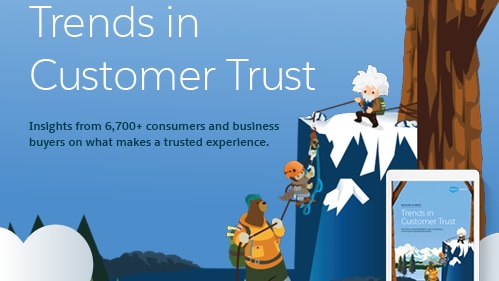Managing the Customer Trust Crisis: New Research Insights



New data privacy laws in Europe and California — not to mention the resulting flurry of updated privacy policy notifications landing in our inboxes — have put privacy matters in the spotlight. But the circumstances that have precipitated this highlight a worrying trend: customers are concerned
New data privacy laws in Europe and California — not to mention the resulting flurry of updated privacy policy notifications landing in our inboxes — have put privacy matters in the spotlight. But the circumstances that have precipitated this highlight a worrying trend: customers are concerned about not just the vulnerability of their personal information, but also how companies handle and use it.
According to the new Trends in Customer Trust report by Salesforce Research, 59% of customers believe their personal information is vulnerable to a security breach. Even worse, 54% don’t believe that companies have their best interests in mind.
Businesses are facing a crisis of customer trust — and this is a big problem — as trust is a key factor driving customer engagement and loyalty. At Salesforce, trust has been a core tenet of our Customer Success Platform from the beginning.
Making trust your number one value isn’t just the right thing to do; it’s also good business. Our study finds that 95% of customers are more likely to be loyal to a company they trust while 92% are more likely to purchase additional products and services from trusted businesses.
Furthermore, 93% of customers are more likely to recommend a company they trust. And given the prevalence and power of social media, online reviews, communities, brand advocates — and detractors — can now quickly influence thousands of customers and prospects with just a single post.
How do companies navigate this dynamic when experiences are increasingly driven by data?
Understand the Personalization Paradox
With customers becoming more skeptical of how their personal information is used, could it be that data-driven customer engagement dead? Hardly. Customers today want brand experiences tailored to their wants and needs. In fact, this expectation is higher today than ever before. Over half (53%) say they expect the offers they receive from businesses to be personalized.
But there’s a problem: 54% of customers say the marketing messages they receive aren’t as relevant as they would like them to be, suggesting that many companies may need to improve — not scale back — their personalization capabilities.
Part of this process involves showing a true understanding of customer needs at a deeper level, well beyond simply addressing customers by name in an email. For example, 84% say being treated like a person — not a number — is very important to winning their business. And with competition for the customer’s dollar intensifying each day, personalized customer experiences are among the biggest brand differentiators.
The question is: how can businesses meet these growing expectations when many customers don’t trust them with the information that allows them to create these experiences in the first place?
Cultivate Trust with Transparency
Without trust, customers are unlikely to disclose the kind of information businesses need to create more personalized experiences. Our research shows that transparency is crucial in this regard: 91% of customers say they’re more likely to trust companies with their personal information if those companies are transparent about how that data is being used.
It’s not enough for businesses to say “we value the security and privacy of our customers’ data.” Businesses need to show how they are doing that and then let customers decide for themselves what information is appropriate to use and what’s not. It shouldn’t come as a surprise that 92% of customers say they’re more likely to trust a business with their data when they’re given control over what information is collected and ultimately used.
Deliver Value in Exchange for Data
Gaining customer trust is vital. Earning that trust, however, means businesses must deliver value. Otherwise, what incentive do customers really have for sharing their personal information?
Personalization is a big part of that value equation. Interestingly enough, it’s less important for certain age groups than others. For example, only 35% of baby boomers and traditionalists are comfortable with companies using information about them in exchange for personalized engagement — a figure that jumps to 64% for millennial and Generation Z customers.
Being educated on how that information will be used for their benefit also plays a crucial role in winning over customers. Seventy-eight percent of baby boomers and traditionalists (vs. 91% of millennials and Gen Zers) say they’re more likely to trust a company with their personal information if the company can clearly explain how having access to that information will provide a better overall customer experience.
Build Trust for the Future
Educating customers is particularly important when rolling out new technologies that power next-generation customer experiences. For example, companies must address the fact that 60% of customers say they are concerned about their information being compromised — or otherwise misused — by artificial intelligence (AI).
Clearly, strong data security, governance, and compliance measures are important for overcoming customer concerns. However, the onus is also on businesses to take the lead in educating customers about how they protect information, why they should be trusted with that information, and what value customers will receive in exchange for providing that information. Part of this involves clear explanations of the benefits of these data-driven technologies that enable them to deliver richer, more personalized customer experiences.
Of course, none of this is possible if customers don’t trust companies in the first place. Because in the new world of data-driven customer engagement, trust is everything
For more insights from Salesforce’s study, see our research brief, Trends in Customer Trust .


























